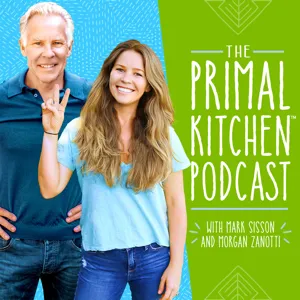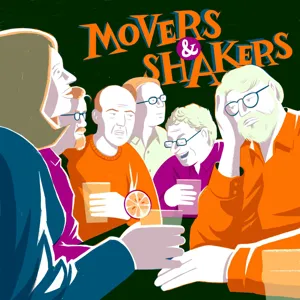Podcast Summary
The connection between our brain and gut: Our brain sends signals to our gut and vice versa, influencing digestion and conditions like anxiety and Parkinson's disease.
Our brain and gut are more connected than we might realize. While we often use phrases like "gut reaction" or "follow your gut," these expressions have a basis in science. Our brain sends signals to our gut, turning on gastrointestinal juices when we think about or smell food. But the connection goes both ways, as scientists are discovering links between the gut and conditions typically associated with the brain, such as anxiety and Parkinson's disease. This fascinating topic is explored in the latest episode of Shortwave, the daily science podcast from NPR. The BBC, an NPR sponsor, is a valuable source of information and inspiration, providing stories that make us think rather than telling us what to think. So whether you're interested in the gut-brain connection or global news, the BBC has you covered.
The gut and brain's evolutionary connection: The gut and brain are deeply interconnected, with the first brain forming around the gut to coordinate gut function and improve digestion. Over time, as organisms consumed more complex foods, their guts became more sophisticated, leading to the development of the enteric nervous system and eventually, the central nervous system.
The gut and the brain are closely connected, having evolved together throughout history. The first brain, or collection of nerve cells, formed around the gut to better coordinate gut function and make digestion more efficient. As organisms evolved and began to consume more complex foods, their guts became more sophisticated, requiring a more intricate nervous system for orchestration. In fact, the gut developed its own nervous system, the enteric nervous system, long before the more complex central nervous system, including the brain, evolved. This connection is crucial for the efficient breakdown of complex food sources into simpler forms that the body can use for energy. Scientists like Jay Pasricha and Sarkis Mazmanian have studied this connection extensively, shedding light on the intricate relationship between the gut and the brain.
Two Nervous Systems: Central and Enteric: Our body has two interconnected nervous systems: the central nervous system in the brain and spinal cord, and the enteric nervous system in the gut with around 100 million neurons, communicating independently and influencing each other via nerves like the vagus nerve and immune connections.
Our body has not one but two nervous systems: the central nervous system in our brain and spinal cord, and the enteric nervous system in our gut. The enteric nervous system contains around 100 million neurons and can communicate independently of the brain. These two nervous systems connect through specific nerves, like the vagus nerve, which acts like a fiber optic cable transmitting signals between the brain and gut. Most messages travel from the gut to the brain. Additionally, there are immune connections between the two systems, with most immune cells residing in the intestines being influenced by the microbiome and environment. These discoveries provide a fascinating new perspective on the complex interplay between our gut and brain.
Gut-Brain Connection: Three Primary Ways Messages Travel: Research suggests a molecule called 4 Ethylphenyl Sulfate (4 EPS) links gut and anxiety, especially in those with autism. Findings in mice may lead to new treatments for anxiety disorders.
The gut and brain are more connected than we once thought. Three primary ways messages travel between the two are through the vagus nerves, the immune system, and molecules produced in the gut. For instance, an infection in the gut can trigger changes in the brain. Researchers in Sarkis' lab are currently investigating how a molecule called 4 Ethylphenyl Sulfate (4 EPS), produced by a human gut microbe, may be linked to anxiety, particularly in individuals with autism. Previous studies have shown that those with autism have higher levels of this molecule. While most research on this topic has been conducted on mice, recent findings suggest that mice with higher levels of 4 EPS exhibit increased anxiety. These findings could pave the way for new treatments for anxiety disorders. Overall, the gut-brain axis is a complex and fascinating area of research, and scientists are only beginning to unravel the intricacies of this intricate relationship.
New research links gut microbes to anxiety and Parkinson's disease: Research suggests that certain gut microbes can impact brain function and behavior, potentially contributing to anxiety and neurological conditions like Parkinson's disease. Ongoing studies aim to explore the safety and efficacy of targeting these microbes to improve symptoms.
Recent research has shown that a specific microbial chemical can change the brain and behavior of mice, leading to increased anxiety. This is believed to happen by altering how neurons communicate with each other. Human studies, specifically a small clinical trial focusing on adolescents with autism, have shown improvements in anxiety and irritability, but these effects disappeared when the drug was stopped. Researchers are currently recruiting for larger clinical trials to further investigate the safety and efficacy of this drug. Additionally, there is ongoing research into the connection between the gut and Parkinson's disease. While the exact cause is unknown, researchers have noticed that protein clumps associated with Parkinson's are also found in the gut. A mouse study suggests that cutting the vagus nerve, the main communication highway between the gut and the brain, can prevent these changes from occurring in the brain. These findings highlight the potential role of the gut in various neurological conditions and the importance of continued research in this area.
The gut's influence on neurological conditions: New research reveals the gut's role in various neurological conditions, including Parkinson's disease, autism, depression, Alzheimer's, and pain perception. The microbiome's impact on brain health is also being explored, with potential advancements in human health expected in the next decade.
The connection between the gut and the brain is more significant than previously thought. The gut could play a crucial role in various neurological conditions, including Parkinson's disease, autism, depression, Alzheimer's disease, and even pain perception. Research suggests that some forms of Parkinson's may originate in the periphery, particularly in the gut. The microbiome, the community of microorganisms in the digestive tract, is also believed to have a significant impact on brain health, although much is still unknown about how to tailor diets to optimize it. Researchers are confident that major advancements in human health will come from unlocking the secrets of the microbiome in the next decade. This newfound knowledge has made many think more deeply about the relationship between what we eat and how it affects our brains.
The Team Behind the Scenes of NPR's Shortwave: Dedication and teamwork of Burley McCoy, Giselle Grayson, Abby Levine, Gilling Moon, Brennan Krump, Beth Donovan, and Anya Grundmann make NPR's Shortwave possible, with support from Easycater and Capella University.
Key takeaway from this episode of Shortwave, the daily science podcast from NPR, is the dedication and teamwork behind the scenes that makes the production possible. The podcast is produced by Burley McCoy, edited by Giselle Grayson, fact checked by Abby Levine, and engineered by Gilling Moon. The team also includes Brennan Krump as podcast coordinator, Beth Donovan as programming senior director, and Anya Grundmann as senior vice president of programming. Emily Quang and Burley McCoy host the show. The podcast is supported by Easycater, a company helping businesses find food for meetings and events online, and Capella University, offering flexible online degree programs. The message emphasizes the importance of teamwork and support systems, both within the podcast team and from their sponsors.





